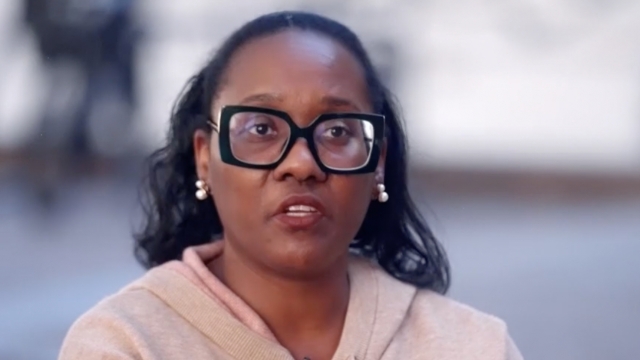Angela Hodges doesn't need to think back very far to recall an instance of feeling outnumbered.
"I had a moment just last week," she said outside her college classroom. "We're all sitting in a room trying to problem-solve something with some secondary leaders, and I looked around and I was like, 'I am the only woman in this room.'"
Hodges and her classmate Shermika Fluker are high-ranking officials in suburban Texas school districts. They're also in grad school at the University of Texas in Austin, in a program specifically geared to groom superintendents.
"I've been the first in a lot of roles," Fluker said. "I've been the first African American woman in a lot of roles."
Women make up 77% of public school teachers and 56% of public school principals. We know these statistics because the Department of Education tracks them. They don't track for superintendents.
"It's kind of surprising in 2024 that we're not tracking for this," said David DeMatthews, who runs the program at UT Austin as well as the Texas Education Learning Lab. "The U.S. Department of Education was collecting this data, I think, up until the 1950s or '60s, and I think nobody was really interested at the time, and they just stopped collecting it."
But today we can tell you women make up a mere 29% of public-school superintendents. We can tell you, in the past few years, when a superintendent left their post, they were replaced by a man 2 out of 3 times. And we can tell you that 1 in 5 American superintendents has 1 of 10 first names.
We can say all of that because of the work at a different UT with a slightly different shade of orange.
Rachel S. White is a professor at the University of Tennessee in Knoxville. She founded and runs The Superintendent Lab. Her team calls every district in the nation every year to document who runs America's schools.
"We now have data that says very concretely that there are inequalities and inequities," White said. "And they persist through the whole pipeline. Having the data allows women — and they shouldn't have to — but it allows them to really strongly lean on empirical evidence that this is the reality in the field."
"I'm of the belief that public education is under attack," DeMatthews said. "We need our best leaders — those who are courageous, those who are committed to communities in these particular roles — to be advocates for public education and to push back when policymakers are doing things that are out of step."
To address an issue, you must confirm it exists. White and DeMatthews say having the data provides a path to discussion. In the meantime, Hodges and Fluker stay focused on the dry, technical, complicated work of preparing to fill a meaningful role.
"I don't live my day-to-day thinking about it," Hodges said. "I don't allow that to be a reason why I'm not somewhere I want to be. It's just kind of like an epiphany moment I'll have from time to time."
SEE MORE: Utah bill would increase pay to make teaching a 6-figure job
Trending stories at Scrippsnews.com





